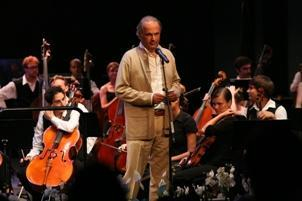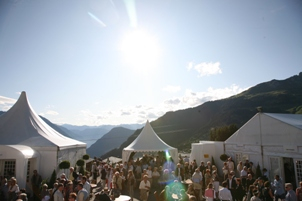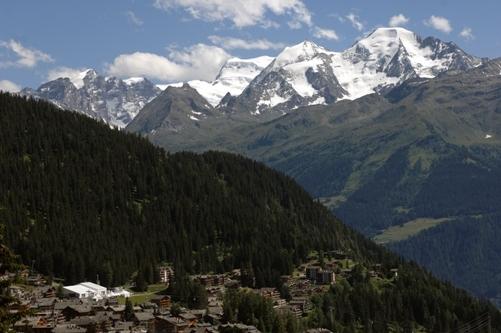It becomes increasingly hard for a music festival to stick out from the crowd these days. But high culture, high summer and high altitude create a rousing major chord each July in Verbier, which can genuinely claim to be the only festival you reach by cable car. When you get up there you are greeted by an alpine symphony of glaciers slithering off peaks and pastures clanging with cowbells. Streams descant and trill along gutters between chalets. No wonder stellar musicians drop their fee to return, both to play and listen. Egos are left at the bottom of the mountain.
But location is only part of the allure. For musicians, the rarefied atmosphere acts as a sort of honey trap. Classical music’s aristocracy come in their droves to the Swiss resort, and for days and days they never leave. Where the majority of festivals sprinkle stellar names among rising hopefuls, in Verbier it is possible to see the world’s greatest performers, night and after night. For this year’s fortnight, the cast list includes festival director Charles Dutoit, with conductors Semyon Bychkov, Rafael Frühbeck de Burgos, Daniel Harding and on the final night’s performance of Salome, Valery Gergiev. Among the soloists are Evgeny Kissin, Elisabeth Leonskaja, Martha Argerich, Joshua Bell, Leonidas Kavakos, Gidon Kremer and Hélène Grimaud.
Martha Argerich performs Bach at the 2008 Verbier Festival
The programming guru who summons all these stars to high altitude is Martin Engstroem (pictured below right), a languid Swede who in another life discovered the limitations of being a top-of-the-range agent. “I was always caught in between the organiser and artist and it was extremely frustrating," he tells me. "I started playing with the idea: wouldn’t it be great to have the last word?” A couple of summer visits to Verbier persuaded him that this was the ideal location for a daring experiment in classical chemistry. It had a functioning infrastructure, wealthy home-owners galore who had no other reason to visit in summer, plus it was the end of the line. “Nobody comes here by mistake," he says. “You don't happen to come to Verbier.”
 As he speaks on the balcony of his chalet office, the horn chorale from Der Freischütz levitates in the Alpine air like the paragliders floating high across the valley. They are rehearsing for an evening performance. Among those who were seduced in the first year were Kissin, Zubin Mehta, Maxim Vengerov, Mischa Maisky and Kent Nagano. That was 16 years ago. The stars have been dropping their monstrous fees at Engstroem’s invitation ever since. The eminent Lynn Harrell, for example, has brought his cello along on six separate visits.
As he speaks on the balcony of his chalet office, the horn chorale from Der Freischütz levitates in the Alpine air like the paragliders floating high across the valley. They are rehearsing for an evening performance. Among those who were seduced in the first year were Kissin, Zubin Mehta, Maxim Vengerov, Mischa Maisky and Kent Nagano. That was 16 years ago. The stars have been dropping their monstrous fees at Engstroem’s invitation ever since. The eminent Lynn Harrell, for example, has brought his cello along on six separate visits.
“It does have a a unique appeal,” he says. “For the musicians, it’s playing with the very elite. Soloists work with people they’ve never worked with before, and have never played the works that Martin asks them to play. It’s kind of a utopian artistic musical society that is all here in one very small place. I find it necessary to the artistic spirit and the stimulation that I achieve here keeps me going for months and months.”
Lynn Harrell and Yuja Wang perform Rachmaninov at the 2008 Verbier Festival
The utopian ideal is built on equality. In winter, young people lug skis up Verbier’s main drag. In summer, it’s instruments, borne by academy students who come from allover the world to learn at the feet of maestri. World-class soloists also have to muck in. Two years ago Nicola Benedetti stayed for 10 days but not just to perform her own recital; she was also shunted into a trio and a quintet. “There seems to be nowhwere that does it quite like here,” she says. “Some of the programmes put together by the festival just will not happen anywhere else. The place is absolutely magical. There’s nothing not to come for.”
She didn’t want a fee. She wanted a chalet and a mountain bike, which she got
Conductors equally are asked to work not with their own orchestra but the resident youth orchestra, featuring the stellar young orchestral players of the future. In 2008, the year I went, both Valery Gergiev and Gianandrea Noseda led them through Mahler. “It is very re-energising,” says Noseda, who first pitched up in Verbier three years ago at a day’s notice. “Somtimes you have to be a teacher with a young orchestra. It’s not the case here. I bring my experience but they give the freshness. It is very mutual.”
Now and then Engstroem throws his audience a curve ball. A decade ago it was Björk, who asked if she could perform Schoenberg’s Pierrot lunaire. “She didn’t want a fee. She wanted a chalet and a mountain bike, which she got.“ Two years ago, Rufus Wainwright in a red polka-dot suit sashayed onstage in the Salle Médran, the main concert venue, to sing not only his own music but also Berlioz and Mozart. He even bravely waded right into the trio from Così with two sopranos.
'Oh wait, we need the opera singers': Rufus Wainwright performs at the 2008 Verbier Festival
 Performances take place across the village. There is the 500-seat church, a modern cultural centre called Le Hameau where academy musicians do their workshops, and a studio space called Chalet Orny. But the main stage is a 1600-capacity tent erected near the famous Au Vieux Verbier tavern. It’s a tent, large enough to house a couple of Eayjets, or 1600 classical enthusiasts who make the annual pilgrimage here like migrating wildebeest returning for the rains (pictured above left). And every year the location reminds the musicians that they are answerable to a higher master even than Engstroem. When during a recital the thunder rumbles among the surrounding summits, it sounds like a couple of Wagnerian gods shifting furniture in the attic. Then the rain comes. The first concert I attended, Angelika Kirchschlager had no sooner opened her mouth to sing Schubert than a pattering sounded on the tent canopy. I found it best to think of it as 78rpm needle hiss.
Performances take place across the village. There is the 500-seat church, a modern cultural centre called Le Hameau where academy musicians do their workshops, and a studio space called Chalet Orny. But the main stage is a 1600-capacity tent erected near the famous Au Vieux Verbier tavern. It’s a tent, large enough to house a couple of Eayjets, or 1600 classical enthusiasts who make the annual pilgrimage here like migrating wildebeest returning for the rains (pictured above left). And every year the location reminds the musicians that they are answerable to a higher master even than Engstroem. When during a recital the thunder rumbles among the surrounding summits, it sounds like a couple of Wagnerian gods shifting furniture in the attic. Then the rain comes. The first concert I attended, Angelika Kirchschlager had no sooner opened her mouth to sing Schubert than a pattering sounded on the tent canopy. I found it best to think of it as 78rpm needle hiss.
“There is absolutely nothing I can do about it,” says Engstroem, who has never cancelled a concert. “There are artists like Alfred Brendel who say, ‘Let me play in the church.’ Fine. The first year, Kissin was playing Kinderszenen and there was a trumpet player practising outside. You never know what’s going to happen.”














Add comment